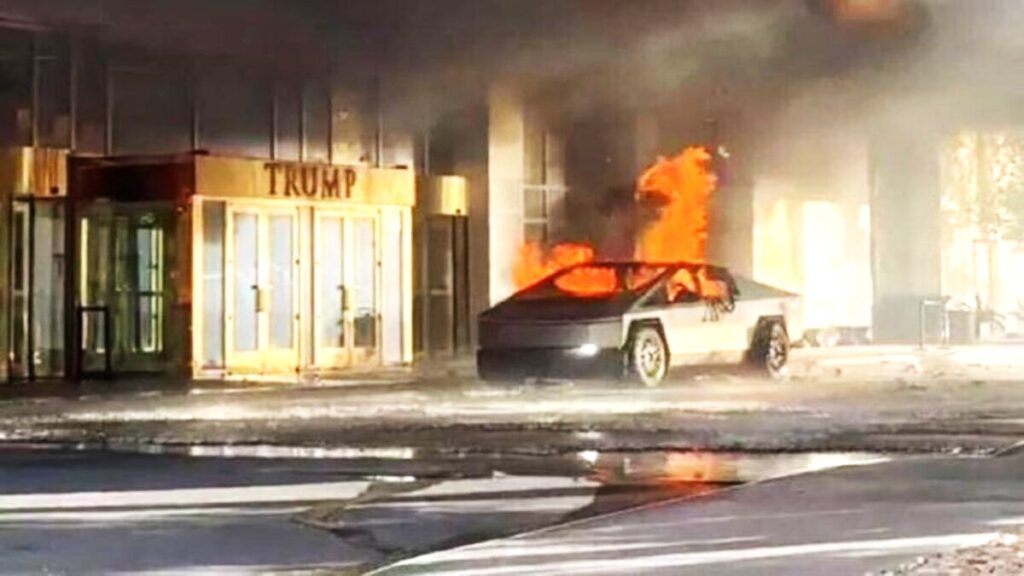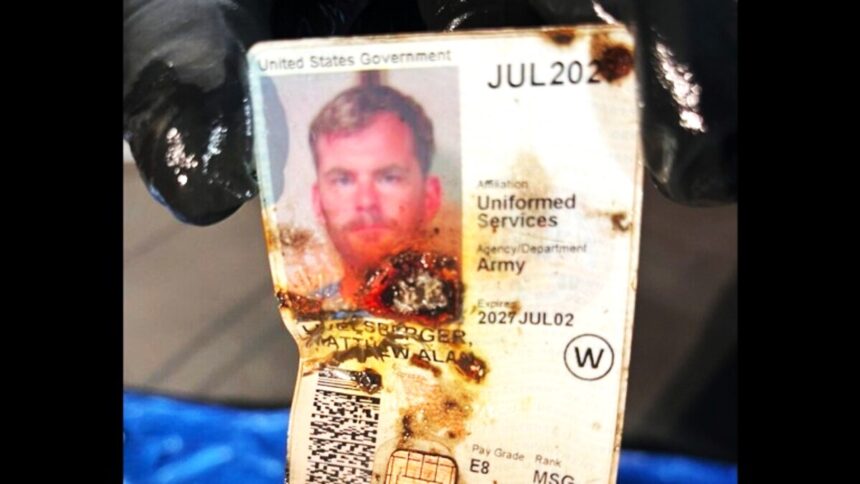A deeply disturbing incident unfolded on New Year’s Day when a rented Tesla Cybertruck exploded outside the Trump International Hotel in Las Vegas. The explosion, which injured seven people, has now been linked to Matthew Livelsberger, a 37-year-old Green Beret veteran. While initially sparking suspicions of terrorism, recent investigations reveal a far more personal and tragic story. The FBI has suggested that Livelsberger, who died in the blast, was suffering from post-traumatic stress disorder (PTSD) and dealing with personal demons. The case highlights the challenges faced by military veterans struggling with mental health issues and the stigma that often surrounds seeking help.

A Military Veteran’s Struggles with PTSD
Matthew Livelsberger was a decorated combat veteran with a history of service in Afghanistan and other conflict zones. He was awarded five Bronze Stars for his bravery and achievements in the military. However, despite his impressive military accolades, Livelsberger struggled deeply with the psychological toll of war. Sources close to the investigation have confirmed that PTSD was a significant factor in his actions. According to Spencer Evans, the FBI special agent in charge, Livelsberger’s tragic decision seemed to stem from a combination of emotional and psychological pain, including the weight of lives lost in combat.
The psychological scars of war, along with personal issues and feelings of guilt, drove Livelsberger to take drastic action. He was on an approved leave of duty at the time of the explosion, which added to the sense of isolation that he might have been feeling. The coroner’s report confirmed that Livelsberger died by suicide just before the explosion occurred, with a handgun found next to his body in the charred remains of the Cybertruck.
Las Vegas FBI Special Agent In Charge Spencer Evans says that Matthew Livelsberger took his own life and blew up the Cybertruck in front of the Trump Hotel in Las Vegas because he was “struggling with PTSD and other issues” pic.twitter.com/NTcYQO7ExL
— Ryan Saavedra (@RealSaavedra) January 3, 2025The Cybertruck Explosion: A Wake-Up Call
Initial reports had many speculating that the explosion might have been a terrorist attack, especially given the location outside the Trump International Hotel in Las Vegas and the use of a Tesla Cybertruck, associated with Elon Musk, a prominent Trump supporter. However, investigators quickly ruled out terrorism, with the FBI clarifying that this was not an act of political violence but rather a desperate cry for attention.
Livelsberger had left behind a chilling note that investigators recovered. In it, he explained that the explosion was not meant as an attack but as a “wake-up call” to a society that often only responds to “spectacles and violence.” His words spoke to the profound disillusionment he felt with American society, which he described as “terminally ill” and headed for collapse. Livelsberger’s writings also reflected deep personal turmoil, including guilt over the lives he had taken during his military service and the loss of his “brothers” in combat.
This was not a terrorist attack, it was a wake-up call,” Livelsberger wrote in his note. Americans only pay attention to spectacles and violence. What better way to get my point across than a stunt with fireworks and explosives? His decision to use fireworks, gas canisters, and camping fuel to trigger the explosion was a calculated attempt to draw attention to his internal struggles.
Personal Grievances and Political Views
The note revealed that Livelsberger had been struggling not only with the weight of his military service but also with personal and political issues. He expressed support for prominent figures like President-elect Donald Trump, Elon Musk, and Robert F. Kennedy Jr., indicating that his grievances were not solely political in nature. Livelsberger’s frustration with society seemed to be a culmination of various factors, including his combat experiences, his views on the state of the nation, and his personal relationships.
Before the explosion, Livelsberger had been documenting his activities in what authorities are calling a “journal of activity.” The journal, which spanned from December 21 to December 31, chronicled his purchases of firearms, camping gear, and other supplies, indicating that he had been planning the act for some time. This journal offers a glimpse into Livelsberger’s troubled state of mind in the days leading up to the explosion.
The Toll of Military Service
Livelsberger’s case underscores the mental health struggles that many veterans face after returning from active duty. His former girlfriend, Alicia Arritt, spoke to the press about Livelsberger’s ongoing battle with guilt over his military service. She recalled that he had spoken of wanting to seek help, but that the shame and stigma associated with mental health issues in the military had made it harder for him to ask for the support he needed.
Arritt explained that Livelsberger had been dealing with the aftermath of combat, including foggy memory and difficulty processing his experiences. These symptoms, she speculated, could have been linked to head injuries or physical trauma sustained during his service. Despite his desire to seek help, the culture of silence and perceived weakness around mental health in the military likely prevented him from getting the care he needed.
A neighbor of Livelsberger’s, Cindy Helwig, described him as “a normal guy” and said that he had even come to her for a tool to fix his SUV in the days before the explosion. This ordinary interaction highlights the stark contrast between Livelsberger’s outward appearance and the inner turmoil he was grappling with. His tragic death has sparked conversations about the mental health crisis affecting veterans and the need for greater awareness and support for those who have served in the military.
A Devastating Coincidence
The Las Vegas Cybertruck explosion occurred on the same day as another tragic event in New Orleans, where a military veteran rammed a rented pickup truck into a crowd on Bourbon Street, killing 14 people. Although both incidents involved veterans and rented vehicles, authorities have found no connection between the two events. However, the simultaneous occurrence of these incidents has drawn attention to the broader issue of mental health struggles among veterans and the potential dangers of untreated PTSD.
The FBI’s ongoing investigation continues to explore every lead and piece of evidence related to Livelsberger’s actions. Authorities are still examining the contents of two cell phones and other materials recovered from the scene, hoping to gain further insights into the circumstances that led to the tragic event.
The Need for Greater Mental Health Support for Veterans
The death of Matthew Livelsberger serves as a somber reminder of the hidden toll of war and the urgent need for better mental health support for military veterans. His tragic act was not only a personal cry for help but also a reflection of the broader challenges facing many veterans who return home without adequate resources to cope with the psychological wounds of war. As more veterans return from active duty, the importance of addressing mental health needs and breaking down the stigma surrounding therapy and support systems becomes ever more critical.






